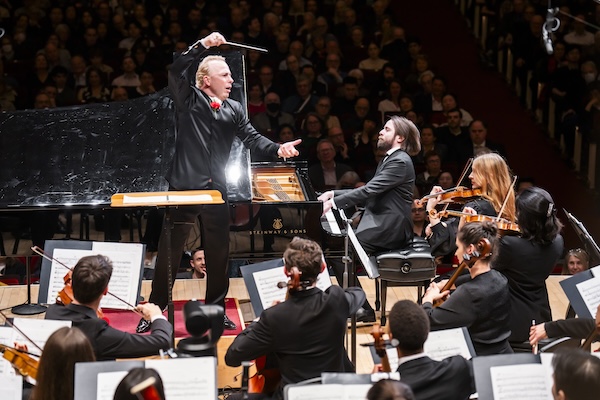A tie for NYO-USA All-Stars with idiomatic Gershwin and interminable Shostakovich

Carnegie Hall’s National Youth Orchestra of the United States of America is already an all-star group. A new ensemble shows up in the hall every summer, and one often wonders what becomes of these talented musicians.
An answer was provided at Carnegie Thursday night, when 100 or so alumni of the NYO-USA appeared as the official NYO-USA All-Stars.
These musicians are continuing their careers at a variety of advanced conservatories and in professional situations, and amount to a skillful orchestra past the point of youth but still exploring their futures. They met conductor Yannick Nézet-Séguin and pianist Daniil Trifonov in a wild and massive program of George Gershwin’s Concerto in F and, after intermission, Shostakovich’s Symphony No. 7, “Leningrad.”
On the face of it, there was an intriguing juxtaposition between an American orchestra and a Russian pianist playing Gershwin (followed by Americans playing Russian music). There was a lot of pleasure on both sides in the concerto, the main surprise that Trifonov was right at home in the idiomatic flavors of the music, while the orchestra wasn’t quite there. With Nézet-Séguin and his typical enthusiasm on the podium, the orchestra’s energy was at the highest level, but the colors didn’t have the last measure of Gershwin’s sound, and the rhythmic accents weren’t as sharp as possible.
Trifonov’s, on the other hand, were that and more. The pianist seemed to be having a great time with all Gershwin’s technical demands, and also the sheer style. His rhythms were light and pushed forward with the kind of proto-swing that’s in the music. No surprise that a pianist on Trifonov’s level would enjoy playing music by another fantastic pianist, and the spirit was terrific.
That meant that while the orchestra was often heavy—while also being excitingly loud and energetic—and swamping the piano, Trifonov was jaunty throughout. In the slow, more serious music of the first movement and middle movement itself, he was wry in a modern, urbane manner. In the lively finale, his hands were positively leaping off the keys with delight. It was a nice surprise to see such a serious artist with such a big smile on his face as he took his bows. And his encore stayed in the modern American spirit, with a quiet, lyrical transcription of the great jazz pianist Bill Evans playing Young and Heyman’s “When I Fall in Love.”
The experienced listener eyed the “Leningrad” symphony with cautious optimism. Though it is famous music, it is easily the worst of Shostakovich’s symphonies and perhaps of his entire output. It is foremost propaganda, a tribute to the resistance to the Nazis during the siege of Leningrad in WWII, flown out and premiered live in Carnegie and on the radio with great fanfare by Arturo Toscanini and the New York Philharmonic. It is public and dutiful Shostakovich without the essential conflict between public expression and the outline of the things he dare not speak.
Despite a strenuous argument in the program for a critical reevaluation, and a substantial sheer effort from the orchestra, the performance could not convince one otherwise. The trite “invasion theme” in the enormous first movement—famously mocked by Bartók in his Concerto for Orchestra—simply sucks the edge out of the music, and goes on forever.
As did the performance. Already long, at 75 or so minutes, this one took nearly an hour and a half under Nézet-Séguin. There was little tension or a clear through-line. More distressing was, especially through the Moderato and Adagio movements, orchestra and conductor seemed to be concentrating on each other, with less and less expression delivered to the audience. The performance seemed to wander away from the very public it was meant to impress. The sheer volume of the finale brought cheers from many, but this was a Pyrrhic musical victory.
The Orchestra de Paris with conductor Klaus Mäkelä plays Stravinsky’s Firebird and Rite of Spring 8 p.m., Saturday. carnegiehall.org
Posted Mar 17, 2024 at 6:54 am by Joel Stein
Not sure it’s easily the worst of his symphonies–2,3 and 12 are out there.